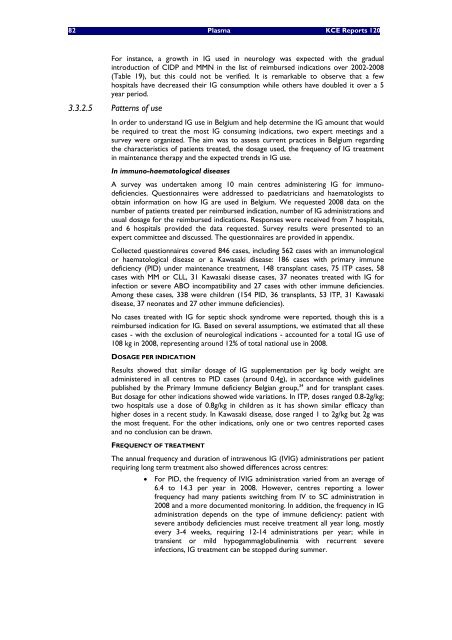The report is available in English with a French summary - KCE
The report is available in English with a French summary - KCE
The report is available in English with a French summary - KCE
Create successful ePaper yourself
Turn your PDF publications into a flip-book with our unique Google optimized e-Paper software.
82 Plasma <strong>KCE</strong> Reports 120<br />
For <strong>in</strong>stance, a growth <strong>in</strong> IG used <strong>in</strong> neurology was expected <strong>with</strong> the gradual<br />
<strong>in</strong>troduction of CIDP and MMN <strong>in</strong> the l<strong>is</strong>t of reimbursed <strong>in</strong>dications over 2002-2008<br />
(Table 19), but th<strong>is</strong> could not be verified. It <strong>is</strong> remarkable to observe that a few<br />
hospitals have decreased their IG consumption while others have doubled it over a 5<br />
year period.<br />
3.3.2.5 Patterns of use<br />
In order to understand IG use <strong>in</strong> Belgium and help determ<strong>in</strong>e the IG amount that would<br />
be required to treat the most IG consum<strong>in</strong>g <strong>in</strong>dications, two expert meet<strong>in</strong>gs and a<br />
survey were organized. <strong>The</strong> aim was to assess current practices <strong>in</strong> Belgium regard<strong>in</strong>g<br />
the character<strong>is</strong>tics of patients treated, the dosage used, the frequency of IG treatment<br />
<strong>in</strong> ma<strong>in</strong>tenance therapy and the expected trends <strong>in</strong> IG use.<br />
In immuno-haematological d<strong>is</strong>eases<br />
A survey was undertaken among 10 ma<strong>in</strong> centres adm<strong>in</strong><strong>is</strong>ter<strong>in</strong>g IG for immunodeficiencies.<br />
Questionnaires were addressed to paediatricians and haematolog<strong>is</strong>ts to<br />
obta<strong>in</strong> <strong>in</strong>formation on how IG are used <strong>in</strong> Belgium. We requested 2008 data on the<br />
number of patients treated per reimbursed <strong>in</strong>dication, number of IG adm<strong>in</strong><strong>is</strong>trations and<br />
usual dosage for the reimbursed <strong>in</strong>dications. Responses were received from 7 hospitals,<br />
and 6 hospitals provided the data requested. Survey results were presented to an<br />
expert committee and d<strong>is</strong>cussed. <strong>The</strong> questionnaires are provided <strong>in</strong> appendix.<br />
Collected questionnaires covered 846 cases, <strong>in</strong>clud<strong>in</strong>g 562 cases <strong>with</strong> an immunological<br />
or haematological d<strong>is</strong>ease or a Kawasaki d<strong>is</strong>ease: 186 cases <strong>with</strong> primary immune<br />
deficiency (PID) under ma<strong>in</strong>tenance treatment, 148 transplant cases, 75 ITP cases, 58<br />
cases <strong>with</strong> MM or CLL, 31 Kawasaki d<strong>is</strong>ease cases, 37 neonates treated <strong>with</strong> IG for<br />
<strong>in</strong>fection or severe ABO <strong>in</strong>compatibility and 27 cases <strong>with</strong> other immune deficiencies.<br />
Among these cases, 338 were children (154 PID, 36 transplants, 53 ITP, 31 Kawasaki<br />
d<strong>is</strong>ease, 37 neonates and 27 other immune deficiencies).<br />
No cases treated <strong>with</strong> IG for septic shock syndrome were <strong>report</strong>ed, though th<strong>is</strong> <strong>is</strong> a<br />
reimbursed <strong>in</strong>dication for IG. Based on several assumptions, we estimated that all these<br />
cases - <strong>with</strong> the exclusion of neurological <strong>in</strong>dications - accounted for a total IG use of<br />
108 kg <strong>in</strong> 2008, represent<strong>in</strong>g around 12% of total national use <strong>in</strong> 2008.<br />
DOSAGE PER INDICATION<br />
Results showed that similar dosage of IG supplementation per kg body weight are<br />
adm<strong>in</strong><strong>is</strong>tered <strong>in</strong> all centres to PID cases (around 0.4g), <strong>in</strong> accordance <strong>with</strong> guidel<strong>in</strong>es<br />
publ<strong>is</strong>hed by the Primary Immune deficiency Belgian group, 34 and for transplant cases.<br />
But dosage for other <strong>in</strong>dications showed wide variations. In ITP, doses ranged 0.8-2g/kg;<br />
two hospitals use a dose of 0.8g/kg <strong>in</strong> children as it has shown similar efficacy than<br />
higher doses <strong>in</strong> a recent study. In Kawasaki d<strong>is</strong>ease, dose ranged 1 to 2g/kg but 2g was<br />
the most frequent. For the other <strong>in</strong>dications, only one or two centres <strong>report</strong>ed cases<br />
and no conclusion can be drawn.<br />
FREQUENCY OF TREATMENT<br />
<strong>The</strong> annual frequency and duration of <strong>in</strong>travenous IG (IVIG) adm<strong>in</strong><strong>is</strong>trations per patient<br />
requir<strong>in</strong>g long term treatment also showed differences across centres:<br />
• For PID, the frequency of IVIG adm<strong>in</strong><strong>is</strong>tration varied from an average of<br />
6.4 to 14.3 per year <strong>in</strong> 2008. However, centres <strong>report</strong><strong>in</strong>g a lower<br />
frequency had many patients switch<strong>in</strong>g from IV to SC adm<strong>in</strong><strong>is</strong>tration <strong>in</strong><br />
2008 and a more documented monitor<strong>in</strong>g. In addition, the frequency <strong>in</strong> IG<br />
adm<strong>in</strong><strong>is</strong>tration depends on the type of immune deficiency: patient <strong>with</strong><br />
severe antibody deficiencies must receive treatment all year long, mostly<br />
every 3-4 weeks, requir<strong>in</strong>g 12-14 adm<strong>in</strong><strong>is</strong>trations per year; while <strong>in</strong><br />
transient or mild hypogammaglobul<strong>in</strong>emia <strong>with</strong> recurrent severe<br />
<strong>in</strong>fections, IG treatment can be stopped dur<strong>in</strong>g summer.

















